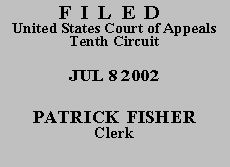

| DEMONTE LAMONZ OUSLEY,
Petitioner - Appellant, v. RON WARD, Respondent - Appellee. |
|
Petitioner Demonte Lamonz Ousley appeals the district court's denial of his 28 U.S.C. § 2254 habeas corpus petition.(1) Ousley was convicted in Oklahoma state court of two counts of robbery with firearms, sexual battery, and forcible sodomy, after former conviction of two or more felonies. His habeas petition raised two claims relevant to this appeal: (1) violation of due process rights by the introduction of tainted eyewitness identification testimony, and (2) violation of the right to effective assistance of trial counsel by his attorney's failure to investigate and present the possibly exculpatory identification testimony of a witness identified in police reports.(2)
The magistrate judge assigned to the case carefully analyzed the petition and examined the record. Addressing the merits of the identification claim, the magistrate judge determined that the eyewitnesses' identifications of Ousley were reliable and that admission of their testimony did not violate his due process rights. See Grubbs v. Hannigan, 982 F.2d 1483, 1490 (10th Cir. 1993) (quoting Kirby v. Illinois, 406 U.S. 682, 691 (1972) for the proposition that a pre-trial identification procedure violates due process only when it "is so unnecessarily suggestive that it is 'conducive to irreparable mistaken identification'"). As to Ousley's claim regarding the exculpatory witness, the magistrate judge observed that, when brought in a state petition for post-conviction relief, the Oklahoma Court of Criminal Appeals concluded that the claim was procedurally defaulted for failure to bring it in his direct appeal. The magistrate judge rejected Ousley's argument that his admitted procedural default was overcome by a showing of actual innocence. See Sellers v. Ward, 135 F.3d 1333, 1338-39 (10th Cir. 1998) (describing the showing of actual innocence necessary for consideration of the merits of an otherwise barred claim).
Therefore, the magistrate judge's recommendation was to deny Ousley's habeas petition. Upon de novo review, the district court adopted the report and recommendation and denied the petition.
This court has conducted a de novo review of the parties' briefs and contentions and the entire record on appeal. Based on that review, this court AFFIRMS for substantially those reasons set forth in the district court's order
filed March 30, 2001, and the magistrate judge's report and recommendation filed October 26, 2000.
Entered for the Court
Circuit Judge
*. This order and judgment is not binding precedent, except under the doctrines of law of the case, res judicata, and collateral estoppel. The court generally disfavors the citation of orders and judgments; nevertheless, an order and judgment may be cited under the terms and conditions of 10th Cir. R. 36.3.
1. Previously, this court granted a certificate of appealability. See 28 U.S.C. § 2253(c).
2. In his appellate brief, Ousley argues that appellate counsel was ineffective for failure to present this issue on direct appeal. Because this claim of ineffective assistance of appellate counsel was not made in the district court, we decline to consider it on appeal. "[A]bsent extraordinary circumstances, [this court] will not consider arguments raised for the first time on appeal. "This is true whether an appellant is attempting to raise 'a bald-faced new issue' or a new theory 'that falls under the same general category' as a previous argument." McDonald v. Kinder-Morgan, Inc., 287 F.3d 992, 999 (10th Cir. 2002) (quoting Lyons v. Jefferson Bank & Trust, 994 F.2d 716, 722 (10th Cir.1993).